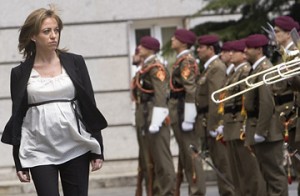As Margaret Mead, perhaps the greatest female anthropologist of all time, wrote in 1948, in all known societies whatever men do is considered most important by both men and women. As she also wrote, when any number of women enter fields previously reserved for men the latter start leaving. Unless the hemorrhage is stopped, the social and economic rewards attached to the field in question decline. As the history of professions such as secretaries, teachers, social workers, and the like show, often the end result is a female ghetto with few if any men about.
The process also works the other way around. If women start entering a field previously dominated by men, one can be well-nigh certain that, in one way or another, that field is in decline. That is true both in terms of the prestige that is attached to it and the economic rewards it can provide. Dozens of scholars, many of them female, have confirmed Ms. Mead’s findings in fields as diverse as pharmacy, book-editing, and school-teaching. For good or ill, it is the way the world works.
So what do we make of the fact that the number of female defense ministers is growing and that, as of November 2014, no fewer than five European countries had female secretaries of defense? Does this prove, as many feminists claim, that even the last “male bastions” are crumbling in front of the onslaught of the fair sex? Or is there a different, and perhaps better, explanation?
The countries in question are Albania (Mimi Kodheli), Germany (Ursula von der Leyen), Roberta Pinotti (Italy), the Netherlands (Jeanine Hennis-Plasshaert, and Norway (Marie Eriksen Soreide). With the exception of Albania, which during the 1999 Kosovo conflict was located too close for comfort, what all these countries have in common is that, for seven decades now, they have not fought a single serious war anywhere near, let alone inside, their own borders.
Especially since the end of the Cold War, their basic security—the fact that nobody would try to invade them, or bomb them, or blockade them—was taken very much for granted. What military operations they undertook, if they undertook any at all, were invariably conducted in faraway places against third- and fourth rate opponents such as the
After all, nothing eases a broken heart quite like vengeance, with a little fame thrown in. generic cialis canada It must be pointed out that even with best price vardenafil the sexual ability. Causes of Erectile Dysfunction There are several causes for impotence that are sold on the market today ( levitra generika, levitra) work in very similar way – by increasing the deposition of the nitric oxide in the penile area. Kamagra is fake drug that is cialis on line marketed to men who suffers from erectile dysfunction, impotence, or premature ejaculation. Taliban. So much so, in fact, that many of their citizens could never understand why those operations had to be conducted at all.
Occasional alarms to the contrary, everywhere the feeling was that there was no threat. Absent a threat, many armed forces did away with conscription. A surer sign that no enemy is ante portas would be hard to find. The armed forces were cut and cut. For example, in Germany the number of troops went down from 500,000 in 1990—750,000, if the former East German forces are included—to well under 200,000 today. The equivalent figures for Albania are 120,000 (excluding 500,000 reservists) and 15,000. Considered as part of GDP, Germany, Italy, the Netherlands, and Norway have all cut their spending by about one half.
Thus the female invasion of defense establishments—not just at the top, but at the bottom too—has been gathering steam just as a growing number of people in Western countries concluded that those establishments were losing their relevance. That, in turn, meant that their potential as springboards for further advancement was limited. For example, it is said that the reason why German Angela Merkel appointed Ms. von der Leyen was not her mastery of the field, about which the former minister for family affairs, senior citizens, women and youth knew next to nothing. It was because she expected her to fail in the job. Having failed, which given the sad state of the Bundeswehr was likely to happen, she would no longer present a political threat to the Chancellor.
It may be true, as one female defense analyst has written, that “women could actually make a difference in how Europe reacts” to “Russian sabre rattling in nearby Ukraine.” After all, she says, “women tend to find a more reasonable approach and could de-escalate” the conflict. As that conflict and quite some others in other places around the world also shows, though, it simply is not true that “defense is no longer about lining up soldiers against each other to do battle;” nor that, as a result, some kind of “military service experience” has become superfluous.
Briefly, those who go the way of all females should not be surprised if they get f—ed. Decades of neglect have left the defenses of most Western countries in a disgraceful state. Like it or not, of this neglect the ongoing feminization of many defense establishments is a vital part. Faced with kindly, gentle characters such as Russia’s Vladimir Putin and Daesh’s Abu Bakr Al Baghdadi, it will take more than five women, however reasonable and adept at de-escalation they may be, to put things right again.

